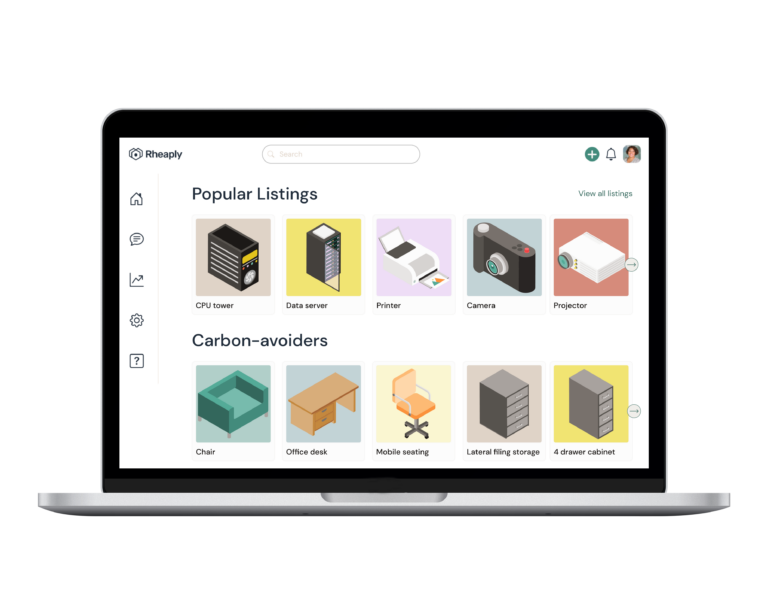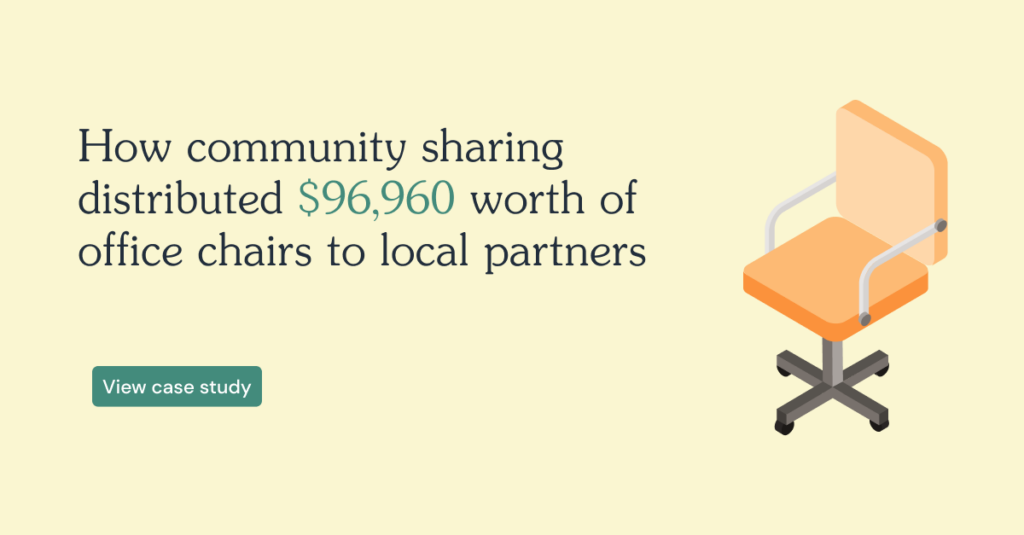What is sustainable procurement?
Rheaply puts reuse on the table for every organization.
What is sustainable procurement?
Sustainability is a pressing issue in virtually any job industry imaginable. Because of the significant environmental impact businesses and their supply chains have, the call for sustainable practices is steadily growing. One method of solving the environmental crisis in the corporate world is implementing a sustainable procurement plan. While sustainable procurement may play a significant role in the future of corporate environmental responsibility, many professionals are unaware of what sustainable procurement is and why it is a relevant topic during these times.
The definition of sustainable procurement boils down to how businesses can identify, address, and reduce how their supply chain impacts the environment. Sustainable procurement management is essential for promoting a healthy work environment with sustainable practices. While many workers want to work for a company that values sustainability, some still ask the question: what is sustainable procurement?
Beyond its basic definition, sustainable procurement is a sustainability method that allows companies to identify any low-impact, fair trade, and environmentally friendly suppliers. Additionally, sustainable procurement encourages businesses to use responsibly sourced materials for their products, such as recycled resources. Companies practicing sustainable procurement aim to reduce waste and lessen their carbon footprint by reusing materials instead of throwing resources away after a single use. Sustainable procurement also helps leaders maintain a safe, healthy work environment that values employees.
Sustainable procurement practices require collaboration between all manufacturers and procurement leaders in for-profit and nonprofit organizations. When practiced correctly, sustainable procurement also allows for trustworthy third-party certifications to reassure customers that their purchases are environmentally friendly and sustainable. Organizations not practicing sustainable procurement must consider adopting a sustainable business model to foster a healthy work environment and remain trustworthy to their customers.
One way to begin practicing sustainability in your business is using platforms like Rheaply, a B2B company specializing in sustainable asset management for the circular economy. Rheaply helps companies reduce waste and pollution from their supply chain while regenerating natural systems and getting the most out of their resources.
The importance of sustainable procurement
While you know what sustainable procurement is, you are likely asking: why is sustainable procurement important?
While organizations will have to put in the effort to adopt sustainable procurement practices, those with advanced procurement capabilities will likely adapt easier to the changes. The importance of sustainable procurement cannot be understated. Procurement is essential for all companies because it allows businesses to improve their finances and protect against future challenges that could negatively impact the supply chain.
The drivers of sustainable procurement recognize the increasing number of consumers interested in where their products come from, what they are made from, and how their purchases impact the environment. As sustainability becomes more widespread, businesses must consider how their products impact the planet and their supply chain’s future impacts.
Additionally, implementing sustainable procurement practices is essential for customers seeking brands that are transparent and honest about their practices. Procurement helps businesses meet their zero-waste and sustainability targets to improve the health of their organization and foster a healthy, honest relationship between them and the consumer. Sustainable procurement is also crucial because manufacturers can label their products correctly with all relevant certifications to ensure that consumers know the impact of their purchases and how the product benefits the environment.
Sustainable procurement practices
Following popular sustainability trends isn’t as simple as waking up one day and deciding to use recycled products for your business. Organizations that have not taken the initiative toward environmental consciousness must implement various sustainable procurement practices to maximize sustainability benefits. However, some businesses run into issues because of a lack of practical and straightforward sustainable procurement examples. Without these examples, your organization may fall behind in sustainability trends, causing consumers to shift attention to your competitors operating in a sustainable space.
The principles of sustainable procurement focus on how companies incorporate sustainable practices, drive innovation, promote sustainability, and implement effective criteria. Some common examples of sustainable procurement include businesses identifying low-impact, fair trade, or environmentally friendly suppliers to work alongside. Additionally, a business may practice sustainable procurement by implementing measures to reduce waste and reuse packing materials. Companies must consider the sole use of responsibly sourced production materials. However, sustainable procurement practices go beyond recycling and reusing materials. Sustainability procurement exists in companies that work to foster a healthy work environment where employees are respected, valued, and receiving living wages.
Sustainable procurement is possible when businesses source their materials ethically. Some common sustainable sourcing examples involve recycling used materials and using green steel, plastic, and aluminum when making products. Practicing sustainable procurement requires businesses to go beyond general recycling practices and dive deep into their commitment to reduce carbon emissions, maximize the value of their inventory, and provide visibility so customers can make informed purchases.
To fully implement sustainable practices, businesses must recognize resources and idle assets for their sustainability initiatives. Rheaply is crucial because it helps businesses quantify their recaptured revenue, assess their exchanges for future budgeting allocations, and understand specific details about their design features. Furthermore, Rheaply allows for the impactful redistribution of unused or underutilized resources between businesses and suppliers.

Challenges of sustainable procurement
The benefits of sustainable procurement are bountiful. Because of how idyllic the method seems, you may be curious about why many companies have not implemented sustainable practices. The reason behind this is that sustainable procurement challenges make it difficult for companies to adapt. Understanding the advantages and disadvantages of sustainable procurement is crucial to developing a strategy that reduces your carbon footprint and instills trust in your consumers. By determining what issues your organization faces regarding its environmental impact, you can start creating a sustainable procurement plan that positively impacts your work environment and product reliability.
One of the primary disadvantages of sustainable procurement is that there are multiple issues to address in sustainable practices. Many companies are overwhelmed with the many issues their sustainable practices should cover. While some companies may prioritize reducing energy consumption, others may feel drawn toward sourcing from sustainable suppliers or reducing plastic usage. The array of sustainable procurement best practices makes it difficult to identify what problems a business should focus on before the rest. Furthermore, businesses run into challenges with sustainable procurement because of the struggle to determine the least costly and labor-intensive measures to practice sustainability. By identifying these issues and crafting plans to overcome challenges, businesses can improve their production methods and maintain responsibility.
Sustainability in purchasing and supply
Adhering to sustainable procurement best practices requires organizations to examine practices in their purchasing and supply patterns closely. Sustainability in purchasing and supply chains is essential for any company attempting to reduce its carbon emissions and eliminate any damages caused to the environment.
Identifying why sustainability is crucial in the purchasing and supply process answers a critical question: what does sustainably sourced mean? Businesses practicing sustainable procurement recognize the need for organizations to shift their dependence on the global supply chain onto localized, safer sources. By following a sustainable purchasing policy and sourcing materials from local providers, businesses can improve local supply circularity to reduce carbon emissions from international production and shipping.
Sustainability in purchasing extends beyond how an organization secures its resources and involves how buyers identify and select transparent and sustainable products. Modern buyers are increasingly likely to purchase products based on a seller’s transparent and ethical practices. Furthermore, surplus management in a company’s supply chain is crucial to the circular economy. To implement sustainable practices in the supply chain and purchasing process, companies must focus on differentiating strategies while encouraging engagement with suppliers and consumers.
Additionally, companies must work to establish their core initiatives and policies to integrate into their sustainable procurement process. Sustainable supply-management processes integrate procurement practices during every stage of the supply chain. Some companies may choose to address the need for sustainability through cross-functional initiatives. In contrast, others may collaborate with sustainable partners and suppliers to focus on decarbonizing the supply chain.
Sustainable procurement is only possible if companies integrate sustainable purchasing methods into their core principles. Achieving sustainability in purchasing and supply requires that companies set a standard for sustainability practices that they are required to follow. Companies will succeed by tracking sustainability with their other core targets for growth. While companies track their other targets, they must adapt the structure of their supply and purchasing patterns to align their process with their sustainability goals.
What is sustainable supply chain management?
Companies seeking to create a green supply chain must understand the importance of sustainability to overall supply chain management processes. Before implementing new sustainable practices, you must ask: what is sustainable supply chain management? Sustainable supply chain management integrates ethical and sustainable practices into an organization’s supply chain cycle. Each step of the supply chain cycle is crucial to sustainable supply chain management, from initial sourcing of materials, packaging of goods, and transporting products to their final destination.
Sustainable procurement in supply chain operations requires businesses to minimize wasteful materials and practices while promoting green purchasing. Sustainable supply chain management requires companies to develop an awareness of their environmental impact. By shining a light on negative management processes, businesses can analyze their environmental and economic impact while crafting a plan to reduce their negative effect on the environment. Sustainability supply chain management will differ based on your company’s products and services.
Green purchasing in supply chains is ultimately crucial to your organization and the environment. Rheaply offers various resources and solutions to encourage businesses to move toward green purchasing and sustainable procurement in supply chains. Rheaply’s focus on enterprise businesses and the technology, manufacturing, government, construction, and healthcare industries are essential to promoting sustainable procurement and implementing green practices that positively impact the environment.


